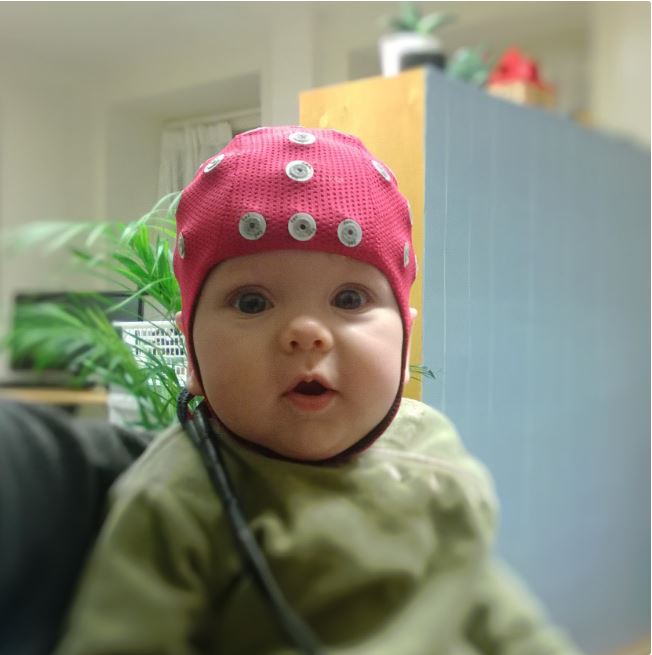A first of its kind neuroscience study, published this month in Cerebral Cortex, found changes in the brain electrical activity of infants exposed to SSRI antidepressants during pregnancy. The changes are associated with less-organized communication between the brain’s hemispheres and are comparable to the effects found in previous animal studies. The researchers call for more critical evaluations of the prescription of antidepressants during pregnancy and suggest that non-pharmacologic and therapeutic alternatives should be the preferred treatment.
“If the mother using an SRI plans a pregnancy, it would be advisable to consider a close follow-up or a therapeutic intervention without SRI medication,” Outi Mantere, a psychiatrist associated with the study said in a press release. “Recent experience with group therapy has shown promise in treating depression or anxiety during pregnancy, with effects that extend to the wellbeing of both mother and baby.”

SSRI antidepressants are commonly prescribed for the treatment of depression and anxiety, among other diagnoses. As the use of these drugs has climbed precipitously in children and adults, so too has their use among pregnant women. While current medical guidelines suggest psychotherapy as a first-line treatment for pregnant women, it is currently estimated that somewhere between 6% and 15% of all women are prescribed antidepressants during pregnancy.
The use of antidepressants in pregnancy has increasingly been linked to a number of severe side effects, however. Several studies have linked exposure to the drug in utero to an increased risk for preterm birth, low birth weight, infant convulsions, cardiovascular defects, excessive brain fluid at birth, smaller head size, and other congenital defects. New research has also revealed evidence linking prenatal antidepressant exposure to developmental issues, including low Apgar scores, neonatal adaptation syndrome, risk of autism spectrum disorder, and cognitive developmental issues.
While the research has grown substantially on the potential risks, less has been done in the field of experimental neuroscience to examine the effects of the drugs on fetal brain development. The latest study, from researchers associated with the BABA center at the University of Helsinki’s Children’s Hospital, features a groundbreaking new study design aimed at separating the drug-related effects on the infant’s brain from environmental and relational developments that happen after birth.
In a study of 84 mothers (22 on SSRIs and 62 controls), the researchers conducted structured behavioral assessments of their newborns and found only minor affects associated with the drugs. When they carried out neurophysiological testing, however, the researchers found lower levels of “global integration,” “interhemispheric connectivity,” and “local cross frequency integration” in newborns exposed to SSRIs in utero. These effects also appeared to outlast the known period of immediate withdrawal common to such newborns.
The unique study design allowed the researchers to compare the results of the analysis with maternal symptoms and other confounding variables, strengthening the contention that “these changes are likely due to medication or an interaction with medication and mood/anxiety rather than maternal depression or anxiety per se.”
“This is the first study to show that prenatal SRI exposure in humans can affect the newborn cortical function beyond the acute withdrawal period,” the team concludes. “Our detailed quantitative, computational EEG analyses indicated SRI-related effects in both focal and global brain activity.”
****
Mad In America has often served as a forum for discussing research on the effects of antidepressants in pregnancy. As part of our newly launched Sunshine Project, we recently released a comprehensive review of the research literature on antidepressant use in pregnancy, and Mad In America Continuing Education (MIACE) offers a course on the risks and possible harm to normal fetal development and the newborn child.
****
Videman, M., Tokariev, A., Saikkonen, H., Stjerna, S., Heiskala, H., Mantere, O. and Vanhatalo, S., 2016. Newborn Brain Function Is Affected by Fetal Exposure to Maternal Serotonin Reuptake Inhibitors. Cerebral Cortex, p.bhw153. (Abstract)













This has got to be one of – if not the most important -undercover- issues facing women’s health and safety today.
I have seen a lot of law suits for new borns of Mothers on AD’s with heart disease and other malforamations, but little on research on this end, so good to see.
Also noted that 274,000 infants (0-1 year olds) and some 370,000 toddlers are on psych drugs.
Why Are So Many Toddlers Taking Psychiatric Drugs? – The Experts …
https://blogs.wsj.com/experts/…/why-are-so-many-toddlers-taking-psychiatric-drugs/
Report comment
It makes me sick Judi….Psychiatrists literally make me want to throw up.
Why exactly would this not be in the “new Yorker”, “the times” and every newspaper?
Psychiatry can never be fixed, because you can’t fix people. The ones who are attracted to psychiatry
ARE the mentally ill. The ability to contain emotions has zero to do with mental health.
The ability to be willing to harm little ones however is LACED with some serious ills
Report comment
Psychiatry is beyond disgusting to do this to babies. Now we know EXACTLY where mental illness lies. It makes me feel a hell of a lot better about my anxiety.
I am realizing that anxiety is indeed a realization that danger comes in the form of an animal with two legs and no empathy. Just cold hearts. If articles like this do not make people anti-psychiatry, none will.
I hope there are many law suits eventually. These are comparable to war crimes. Bastards.
I live with someone that did not raise an eyebrow about this article.
And is a reason why this article got one comment.
Report comment